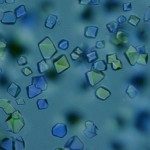Link to Pubmed [PMID] – 22969085
J. Biol. Chem. 2012 Nov;287(45):37583-92
d-Alanyl:d-lactate (d-Ala:d-Lac) and d-alanyl:d-serine ligases are key enzymes in vancomycin resistance of Gram-positive cocci. They catalyze a critical step in the synthesis of modified peptidoglycan precursors that are low binding affinity targets for vancomycin. The structure of the d-Ala:d-Lac ligase VanA led to the understanding of the molecular basis for its specificity, but that of d-Ala:d-Ser ligases had not been determined. We have investigated the enzymatic kinetics of the d-Ala:d-Ser ligase VanG from Enterococcus faecalis and solved its crystal structure in complex with ADP. The overall structure of VanG is similar to that of VanA but has significant differences mainly in the N-terminal and central domains. Based on reported mutagenesis data and comparison of the VanG and VanA structures, we show that residues Asp-243, Phe-252, and Arg-324 are molecular determinants for d-Ser selectivity. These residues are conserved in both enzymes and explain why VanA also displays d-Ala:d-Ser ligase activity, albeit with low catalytic efficiency in comparison with VanG. These observations suggest that d-Ala:d-Lac and d-Ala:d-Ser enzymes have evolved from a common ancestral d-Ala:d-X ligase. The crystal structure of VanG showed an unusual interaction between two dimers involving residues of the omega loop that are deeply anchored in the active site. We constructed an octapeptide mimicking the omega loop and found that it selectively inhibits VanG and VanA but not Staphylococcus aureus d-Ala:d-Ala ligase. This study provides additional insight into the molecular evolution of d-Ala:d-X ligases and could contribute to the development of new structure-based inhibitors of vancomycin resistance enzymes.


